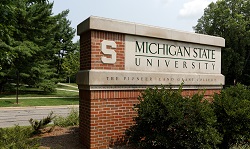 AAU President Appalled at Reports of Interference by Michigan State University Trustees in School Operations
AAU President Appalled at Reports of Interference by Michigan State University Trustees in School Operations
Last Sunday, reports emerged that Michigan State University’s Board of Trustees had initiated a conversation with the university’s president, Samuel Stanley Jr., about the length of his contract. A few members of the board later confirmed that President Stanley Jr. had been asked to retire early, before the end of his contract in 2024.
In response, AAU President Barbara R. Snyder released a statement Monday night saying that she was “appalled at reports of interference in MSU’s day-to-day operations by the university’s trustees.” She noted that the trustees are elected officials in charge of governance, not management, and that their reported interference constitutes “inappropriate meddling.”
President Snyder called attention to the partisan pressures that many leading state universities have faced recently at the hands of elected state officials and that have interfered with universities’ core academic missions. Instead, she said, governing boards and university leaders must work together to educate students, enrich the cultural and civic lives of our communities, and bolster the economy both locally and nationally. “Micromanagement and partisan politics have no place on a healthy university board,” she added.
 Golden Goose Awards Honor Scientists Whose “Silly Sounding Research” Led to Major Breakthroughs
Golden Goose Awards Honor Scientists Whose “Silly Sounding Research” Led to Major Breakthroughs
Earlier this week, the Golden Goose Award honored 11 scientists whose unusual, curiosity-driven research led to major scientific breakthroughs. The Golden Goose Awards were launched in 2012, building upon an idea by Rep. Jim Cooper (TN), to honor federally funded researchers whose work may sound silly, odd, obscure, or wasteful of taxpayer funding, but which has had a major positive impact on society. AAU is one of the founding sponsors of this award, which has enjoyed bipartisan, bicameral support from the U.S. Congress since it was first launched.
This year’s awardees included three international, multi-institutional teams whose research led to bladeless LASIK, which has helped provide corrective eye surgery to millions; a low-cost foldable paper microscope that has made science more accessible worldwide; and a non-opioid pain reliever derived from the venom of tiny cone snails. Each team of awardees included graduates of AAU institutions, including Stanford University, the University of Rochester, the University of Michigan, and the University of Utah. The teams’ stories are told in this short documentary film, now available on YouTube. Please join AAU in congratulating these intrepid scientists!
 AAU, Associations Submit Comments on Proposed Title IX Regulations
AAU, Associations Submit Comments on Proposed Title IX Regulations
AAU joined the American Council on Education and other higher education associations in submitting joint comments in response to the Department of Education’s proposed changes to Title IX regulations. The regulations guide universities that receive federal funding on how to implement laws that prohibit sex-based discrimination in educational programs and activities.
The comments acknowledged universities’ commitment to preventing discrimination and thanked the agency for crafting a rule that reflects the Biden administration’s “attentiveness to this important issue.” The associations’ letter also expressed hope that the agency’s current effort would “put an end to the costly and confusing changes in regulatory requirements that have marked the last decade.” (Both the Obama and the Trump administrations previously made changes to Title IX regulations.)
The associations’ comments are organized in three sections, with the first focused on identifying provisions that “provide greater flexibility and clarity for campuses” and that “would aid efforts to address sex-based discrimination.” The second focused on implementation challenges and raised concerns about the effective date of the final rule as well as the possibility of the final regulations being applied retroactively. The letter urged the department to give institutions at least eight months to prepare for the adoption of the rule and to set an effective date at the start of an academic year. The third section focused on provisions that could benefit from “additional flexibility and clarification.”
AAU also submitted our own comment letter on the proposed regulations last week.
 White House Launches Initiative to Advance Biotechnology and Biomanufacturing
White House Launches Initiative to Advance Biotechnology and Biomanufacturing
Earlier this week, President Biden issued an executive order to launch a National Biotechnology and Biomanufacturing Initiative geared toward driving innovation and fueling the economy by harnessing “the power of biology to create new services and products.” According to a White House fact sheet, “The Initiative will accelerate biotechnology innovation and grow America’s bioeconomy across multiple sectors, including a range of industries, including health, agriculture, and energy.” The executive order defines “bioeconomy” as “economic activity derived from biotechnology and biomanufacturing in developing and producing life-saving diagnostics, therapeutics, and vaccines.”
The initiative directs federal agencies to prioritize research and development as well as training and educational opportunities in bioscience, biotechnology, and biomanufacturing. On Wednesday, the White House Office of Science and Technology Policy held a summit on biotechnology and biomanufacturing, during which several federal agencies announced new investments and resources to support the initiative. The National Institutes of Health, for example, announced that it is launching a Bridge2AI program that would invest $130 million to accelerate the use of artificial intelligence in biomedical and behavioral research.
President Biden to Appoint Renee Wegrzyn as Director of New Biomedical Research Agency
Earlier this week, President Biden announced that he intends to nominate Renee Wegrzyn, current vice president for business development at Ginkgo Bioworks and head of innovation at Concentric by Ginkgo, as the inaugural director of the Advanced Research Projects Agency for Health (ARPA-H). According to the White House announcement, Wegrzyn will drive the agency’s “nascent research portfolio and associated budget,” which is expected to support programs “to develop capabilities to prevent, detect and treat some of the most intractable diseases, including cancer.” ARPA-H is part of President Biden’s vision for a “moonshot” to end cancer as we know it.
Wegrzyn has previously served at the Defense Advanced Research Projects Agency and the Intelligence Advanced Research Projects Agency, and she holds a doctoral degree in applied biology from Georgia Institute of Technology. She will not require Senate confirmation for this position.
News of Interest
The Columbus Dispatch: OSU President: Buckeyes, Wolverines Putting Rivalries Aside in Name of ‘Silicon Heartland’ – The Ohio State University is partnering with 11 other colleges and universities in Ohio, Michigan, and Indiana to form the Midwest Semiconductor Network to help address the research and workforce needs of the domestic semiconductor industry. The Midwest is poised to become the “Silicon Heartland” of the nation, writes Ohio State President Kristina Johnson, and the “Midwest Semiconductor Network will collectively provide the talent and intellectual foundation that makes it possible.”
Inside Higher Ed: ‘Spaces Matter’ – The use of active learning spaces has grown on college campuses. As AAU’s Deputy Vice President for Institutional Policy Emily Miller explains, these spaces have “flexible designs” that encourage “student interaction” and teamwork; they can also help increase student engagement and, according to a new study, have positive outcomes for women students. All AAU institutions, Miller says, have “invested in the redesign of learning spaces.”
WBUR: BU President Robert Brown on Why He’s Stepping Down, What He Hopes to Leave Behind – Last week Boston University President Robert A. Brown announced that he’s stepping down after nearly two decades of service at the end of this academic year. “I've done it for a while, and there naturally comes a time when those transitions should happen,” he tells WBUR, Boston’s local NPR news station.
Inside Higher Ed: Who’ll Pay for Public Access to Federally Funded Research? – The White House announced a new policy in August that would give the public free access to federally funded research, including publications and any underlying data. Questions remain, however, about what the new policy will cost and who will pay for it.
The Chronicle of Higher Education: Despite Sky-High Inflation, No Sign Yet of Surging Tuition Costs – The latest data from the Bureau of Labor Statistics shows that, while prices have gone up by 8.3% across the economy since August 2021, “out-of-pocket college tuition costs for households” have gone up only by 2.79%.
The Champaign News-Gazette: UI to Invest $50 Million to Add 150 to 200 Faculty Members – The University of Illinois Urbana-Champaign is investing $50 million to add 150-200 faculty members over the next several years. Illinois broke its enrollment record this fall and, according to a university official, needs additional faculty to meet student demand and to “keep on the forefront of innovation.”
The Hill: It’s Time to Fund America’s Investments in the Future – In a co-authored guest opinion piece, Rep. Ro Khanna (D-CA) calls on Congress to fund the science programs contained in the CHIPS and Science Act. The authors estimate that, if fully funded, the legislation would raise research and development funding in the United States “by $75 billion over the next five years.” Unfortunately, they note, Congress has a history of “authorizing funding boosts for science only to fall short in appropriations.”
Featured Research

Using Light-up Skullcaps, Neurologist Is Pioneering an Autism Test for Babies
Researchers at the University of Virginia are working to create an easy way to screen babies for autism. Currently most autistic kids aren’t diagnosed until they are five years or older; early detection could lead to new therapies that help autistic children “reach their fullest potential.”

Princeton University researchers found that a majority of Americans support climate action, but believe that other Americans don’t. Researchers say that such misperceptions could hurt support for climate policies in the long run because “people tend to conform to what they think others believe.”